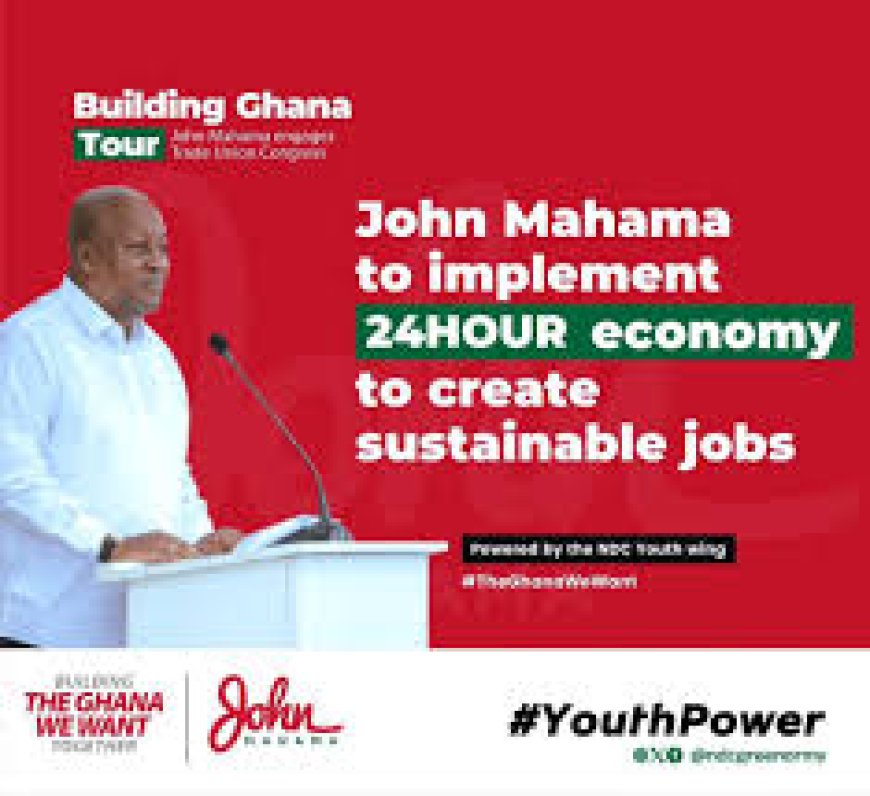The 24-Hour Economy by John Dramani Mahama

Former President and flagbearer, John Dramani Mahama of the National Democratic Congress (NDC)'s 24-hour economy policy is a transformative initiative designed to extend business operations and services across Ghana, creating more jobs and increasing economic participation. By allowing businesses to operate continuously, the policy aims to maximize the nation’s economic potential, improve public services, and enhance the overall quality of life for Ghanaians. Here's a detailed look at how the 24-hour economy policy is structured and the wide-ranging benefits it offers.
The Triangle of the 24-Hour Economy
The success of the 24-hour economy hinges on three key pillars: power generation, transportation, and security measures.
-
Power Generation: The NDC plans to deploy regional and district solar energy systems specifically for domestic use while allocating Volta River Authority (VRA) energy for commercial purposes. This dual approach ensures a steady power supply for both households and businesses, facilitating continuous operations across all sectors.
-
Transportation: Expanding inner-city transportation networks and utilizing Ayalolo buses will play a crucial role in improving mobility, reducing congestion, and supporting the smooth operation of a 24-hour economy. By ensuring that public transport services are available around the clock, the policy aims to make it easier for people to commute to work and access services at any time of the day.
-
Security Measures: To maintain law and order in a 24-hour economy, the NDC plans to enhance security through increased physical presence with more police officers and the deployment of electronic surveillance units in district police stations. This comprehensive approach to security will help prevent crime and ensure the safety of both businesses and individuals during extended hours of operation.
Industries Covered by the 24-Hour Economy
The NDC's 24-hour economy policy will impact various industries, each benefiting in unique ways:
-
Retail: By operating stores and markets around the clock, the policy aims to boost sales and create employment opportunities, making it easier for consumers to shop at their convenience.
-
Healthcare: Continuous medical services will be provided, improving public health outcomes and reducing waiting times for patients. This ensures that healthcare is accessible at any time, particularly in emergencies.
-
Hospitality and Tourism: Keeping hotels, restaurants, and entertainment venues open 24/7 will enhance the tourism and hospitality sectors, attracting more visitors and boosting local economies.
-
Manufacturing: Factories will run on a 24-hour basis, increasing output and efficiency. This round-the-clock production will support economic growth and ensure that Ghana remains competitive in global markets.
-
Transport and Logistics: Continuous public transport services will facilitate the smooth movement of goods and people, enhancing logistics and reducing delays in the supply chain.
-
Emergency Services: The policy ensures that police, fire services, and emergency response teams are available round the clock for quick response and public safety, providing peace of mind for citizens.
-
Ports and Harbours: Operating ports and harbours continuously will improve trade efficiency, reduce waiting times, and benefit the logistics sector, making Ghana a more attractive destination for international trade.
-
Agriculture: Processing facilities will run continuously, enhancing food security by reducing post-harvest losses and ensuring a steady supply of agricultural products.
-
Mining: The mining sector will also operate on a 24-hour basis, increasing productivity and creating more jobs in this critical industry.
-
Education: Higher institutions will be encouraged to adopt a three-shift system and offer online learning, making education more accessible for working professionals and those with other commitments.
Benefits of the 24-Hour Economy
The 24-hour economy policy offers numerous benefits that will positively impact Ghana’s economy and society:
-
Increased Employment Opportunities: By extending business hours, the policy creates jobs across various sectors, reducing unemployment and providing more opportunities for Ghanaians to earn a livelihood.
-
Enhanced Economic Growth: Maximizing productivity and revenue generation attracts more customers and tourists, stimulating economic growth and making Ghana a more competitive economy.
-
Improved Public Services: Continuous availability of essential services like healthcare and transportation will enhance the quality of life for Ghanaians, ensuring that their needs are met at all times.
-
Flexibility for Businesses and Workers: The policy allows businesses to operate at optimal times, providing flexibility in work schedules and making it easier for employees to balance work with other commitments.
-
Better Infrastructure Utilization: Efficient use of infrastructure, such as roads and public transport, reduces congestion and supports better urban planning, leading to more livable cities.
-
Education Access and Career Development: The policy’s emphasis on flexible learning options facilitates access to higher education and career development, ensuring that more Ghanaians can advance their skills and contribute to the economy.
Conclusion
The Former President and flagbearer, John Dramani Mahama and NDC's 24-hour economy policy is a bold and visionary approach to extending business operations and services across Ghana. By focusing on power generation, transportation, and security, the policy aims to create a conducive environment for continuous economic activity. The wide-ranging benefits, from increased employment opportunities to improved public services, make this policy a key driver of Ghana’s economic future. As the country prepares for the 2024 elections, the 24-hour economy stands out as a transformative initiative that promises to elevate Ghana’s economic potential and improve the quality of life for all its citizens.





